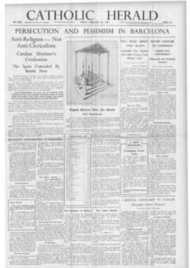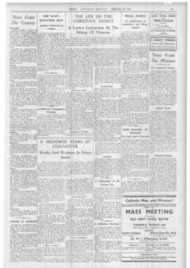Page 14, 26th February 1937
Page 14

Report an error
Noticed an error on this page?If you've noticed an error in this article please click here to report it.
Tags
Share
Related articles
Governor Of Malta Visits Boys' Club
St. Edward's College, Malta
Archbishop Caruana, 0.s.b.
Maltese Hopes For Settlement Still High
The Pope's Health
Sir Augustus Bartolo
In the sudden death of Sir Augustus Bartolo, Malta has lost one of her most
brilliant sons of this generation. He collapsed while addressing members of the Overseas Club in Malta, last Saturday night
The Hon. Sir Augustus Bartolo, LL.D.,
B.Litt., F.R.Hist.S., Judge of His Majesty's Court of Appeal in Malta, was born in the island in 1883, son of Anthony Bartolo, the founder and Editor of the Daily Malta Chronicle. Having won the Government First Scholarship in 1900, Augustus Bartolo proceeded to Malta University, where he took the degree of Bachelor of Literature
in 1904, and three years later that of Doctor of Laws. A clever jurist, his subsequent career was meteoric. He became Professor of Law in his Alma Mater and sat on the committee appointed by the Chamber of Advocates to advise the Royal Commission.
The publication of his Malta, A Neglected Outpost of Empire and The Sovereignly of Malta in 1909 marked a
turning-point. He succeeded in combining a fervent patriotism with enthusiastic Im
perialism. Meanwhile, he was assisting his father in the Editorship of the Daily Malta Chronicle and in journalism he was unequalled in the island. Every cause for the good of his country found expression in his leading articles and every talent of his fellow-countrymen received recognition
within the pages of his newspaper. His journalistic career culminated in his representing the island in the Imperial Press Conferences held successively in Canada. New Zealand and Australia.
Sir Augustus Bartolo was gifted with a prodigious memory. As a youth, when taking part in some amateur theatricals,
the original script was mislaid. Having affirmed his certainty of the text, he was " kept in " until he had written out all the parts from memory. An exceptional linguist, he was as voluble in English and Italian as in his mother-tongue, Maltese, besides being the Latin scholar which his jurisprudence necessitated. Of the literary merits of Maltese he was a lifelong champion, and it is no exaggeration to say that it is largely due to his unceasing defence of that tongue in the cause of democratic education that Maltese is now recognised as the official language, co-equal with English even in the Law Courts. An instance of his amazing versatility is afforded by his translations into Maltese of the light operas, Captain Reece of the Mantlepiece and The Geisha. Indeed, he had just staged a revival of the latter in the week of his death.
He rivalled in girth, though not in height, the late Mr. Chesterton and, like him, not only suffered raillery thereon with the utmost good humour, but himself inspired it. His thought flowed like a cataract and his speech and script followed the torrent. He would himself say that his words " came out like pressed figs." But if it proved occasionally a strain to listen to his oratory, that was because of the constant stream of power. The waters were crystalclear.
About 1921 he founded the Constitutional Party, which soon coalesced with the present Lord Strickland's Anglo-Maltese Party, retaining the former name; and from 1921-1932 he sat continuously in the Malta Parliament, first in the Assembly and then in the Senate. He received portfolios as Minister of Education, Emigration and Labour in Lord Strickland's Cabinet. He was knighted in 1929.
This political alliance brought a ternporary shadow in the religious dispute of 1930, known as the Malta Crisis, and Catholics in England who were privileged to be present will recall Sir Augustus Bartolo's defence of his government's policy, at the Royal Institute of International Affairs, and the subsequent debate in which he engaged Professor de Zulueta, Mr. F. J. Sheed, and others.
Sir Augustus was the first to make his submission to the Archbishop of Malta, Those who knew him intimately will testify to the pain which the dispute caused him. Throughout his life he was a fervent Catholic, a fact reflected throughout his numerous historical writings. From 19121913 he served as Secretary to the Eucharistic Congress held in Malta, and Pope Pius X conferred upon him the Knighthood of the Order of St. Silvester.
His death will be especially mourned by the Sacred Heart Order in Malta, by the Friars Minor of Valletta, and by the Blue Sisters of St. Julian's. It was to the lastnamed that he entrusted the organisation of the Malta War Memorial Hospital for Children—his own inspiration and the first hospital for children in the island. May he rest in peace, W. 13, F.
ST. JOHN'S GAZETTE."—The Lent issue of St. John's Gazette, the magazine of St. John's College, Southsea, contains much interest for the alumni, past and present, of that well-known school. Music is a subject upon which several of the contributors express clearly their views and preferences.
blog comments powered by Disqus

















